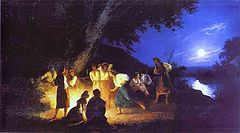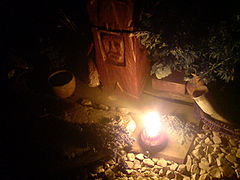- Ivan Kupala Day
-
 Night on the Eve of Ivan Kupala, by Henryk Hector Siemiradzki.
Night on the Eve of Ivan Kupala, by Henryk Hector Siemiradzki.
Kupala Day (Feast of St. John the Baptist; Russian: Иван-Купала; Belarusian: Купалле; Ukrainian: Іван Купала; Polish: Noc Kupały or Noc Świętojańska) is celebrated in Poland, Russia, Belarus and Ukraine currently on the night of 6/7 July in the Gregorian or New Style calendar, which is 23/24 June in the Julian or Old Style calendar still used by many Orthodox Churches. Calendar-wise, it is opposite to the winter solstice holiday Korochun. The celebration relates to the summer solstice when nights are the shortest.
Some early mythology scholars, such as Sir James Frazer, claimed that the holiday was originally Kupala; a pagan fertility rite later accepted into the Orthodox Christian calendar. There are analogues for celebrating the legacy of St. John around the time of the summer solstice elsewhere, including St. John's Day in Western Europe.
The Ukrainian, Belarusian and Russian name of this holiday combines "Ivan" (John — the Baptist) and Kupala which is related to a word derived from the Slavic word for bathing, which is cognate. The latter is reinterpreted as John's baptizing people through full immersion in water (therefore his biblical title of the Baptist). However, the tradition of Kupala predates Christianity, due to correlation to a pre-Christian Slavic god or goddess. Due to the popularity of the pagan celebration that with time it was simply accepted and reestablished as one of the native Christian traditions intertwined with local folklore. On rare occasions it is spelled as Ivanna Kupala (Joann) representing the tradition as feminine.
The holiday is still enthusiastically celebrated by the younger people of the Eastern Europe. The night preceding the holiday (Tvorila night) is considered the night for "good humour" mischiefs (which sometimes would raise concerns of law enforcement agencies). On Ivan Kupala day itself, children are engaged in water fights and perform pranks mostly involving pouring water over someone.
Folklore and Slavic religious beliefs
 Kupala Day, Chram Mazowiecki RKP (2009)
Kupala Day, Chram Mazowiecki RKP (2009)
Many of the rites related to this holiday within Slavic religious beliefs, due to the ancient Kupala rites, are connected with the role of water in fertility and ritual purification. Youths would jump over the flames of bonfires. Girls would float wreaths of flowers often lit with candles on rivers and would attempt to gain foresight into their relationship fortunes from the flow patterns of the flowers on the river. Men may attempt to capture the wreaths, in the hope of capturing the interest of the woman who floated the wreath.
There is an ancient Kupala belief, that the eve of Ivan Kupala is the only time of the year when ferns bloom. Prosperity, luck, discernment and power would befall on whoever finds a fern flower. Therefore, on that night village folks would roam through the forests in search of magical herbs and especially the elusive fern flower.
Traditionally, unmarried women, signified by their garlands on their hair, would be the first to enter the forests. They are followed by young men. Therefore, consequent to the quest in finding herbs and the fern flower may be the blooming of relationships between pairs of men and women within the forest.
It is to be noted that biologists have held the persistent scientific fact that ferns have never and will never bloom.
In Gogol's story The Eve of Ivan Kupala a young man finds the fabulous fern-flower but is cursed by it. Gogol's witches' sabbath on the Eve of Ivan Kupala inspired Modest Mussorgsky to compose his Night on Bald Mountain.
See also
- Fête St-Jean-Baptiste
- Festival of San Juan
- Saint Jonas Day
- St John's Day (Estonia)
- Wianki (Poland)
- Kupala | Kupolė | Midsummer | Pirogovo | Jāņi |
- Semik — a related spring holiday.
- Yanka Kupala — the pen-name of this Belarusian author refers to his birthday of July 7.
External links
- Ukrainian Kupalo traditions
- Russian Kupala traditions
- Celebration of Noc Kupały or Sobótki in Poland
- Celebration of Ivan Kupala Day in Russia
- The tradition of Ivan Kupala’s Night
- The Day of Ivan Kupala as it has survived in the Vologda Region
- Kupalle holiday in Belarus (video) on the Official Website of the Republic of Belarus
Categories:- Holidays in Russia
- Neopagan holidays
- Russian folklore
- Ukrainian culture
- July observances
- June observances
- Summer holidays
- Polish folklore
Wikimedia Foundation. 2010.
